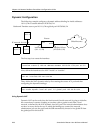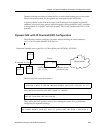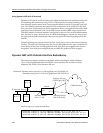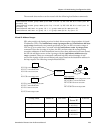
Chapter 15: Web Hosting Configuration Guide
234 SmartSwitch Router User Reference Manual
Load Balancing
Note:
Some commands in this facility require updated SSR hardware. Please refer to the
Release Notes for details.
You can use the load balancing feature on the SSR to distribute session load across a group
of servers. If you configure the SSR to provide load balancing, client requests that go
through the SSR can be redirected to any one of several predefined hosts. With load
balancing, clients access servers through a virtual IP. The SSR transparently redirects the
requests with no change required on the clients or servers; all configuration and
redirection is done on the SSR.
Configuring Load Balancing
The following are the steps in configuring load balancing on the SSR:
1. Create a logical group of load balancing servers and define a virtual IP for the group.
2. Specify the policy for distributing workload for this group of load balancing servers.
This step is optional; by default, the SSR assigns sessions to servers in a round-robin
(sequential) manner.
3. Define the servers in the group.
Creating the Server Group
To use load balancing, you create a logical group of load balancing servers and define a
virtual IP for the server that the clients will use to access the server pool.
To create the server group and define the virtual IP for the server, enter the following
command in Configure mode:.
Specifying Load Balancing Policy (Optional)
The default policy for distributing workload among the load balancing servers is “round-
robin,” where the SSR selects the server on a rotating basis without regard to the load on
individual servers. Other policies can be chosen for the group, including least loaded,
where the server with the fewest number of sessions bound to it is selected to service a
Create group of load balancing
servers.
load-balance create group-name <group
name>
virtual-ip <ipaddr> virtual-port
<port number> protocol tcp|udp
Create a range of load balancing
server groups.
load-balance create vip-range-name <range
name>
vip-range <range> virtual-port
<port number> protocol tcp|udp


















